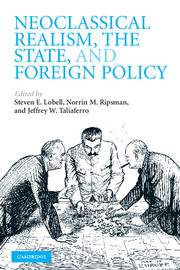Book contents
- Frontmatter
- Contents
- List of figures
- List of tables
- List of contributors
- Acknowledgments
- 1 Introduction: Neoclassical realism, the state, and foreign policy
- 2 Threat assessment, the state, and foreign policy: a neoclassical realist model
- 3 Neoclassical realism and strategic calculations: explaining divergent British, French, and Soviet strategies toward Germany between the world wars (1919–1939)
- 4 Neoclassical realism and identity: peril despite profit across the Taiwan Strait
- 5 Neoclassical realism and the national interest: presidents, domestic politics, and major military interventions
- 6 Neoclassical realism and domestic interest groups
- 7 Neoclassical realism and resource extraction: State building for future war
- 8 Neoclassical realism and state mobilization: expansionist ideology in the age of mass politics
- 9 The limits of neoclassical realism: additive and interactive approaches to explaining foreign policy preferences
- 10 Conclusion: The state of neoclassical realism
- Index
- References
8 - Neoclassical realism and state mobilization: expansionist ideology in the age of mass politics
Published online by Cambridge University Press: 05 June 2012
- Frontmatter
- Contents
- List of figures
- List of tables
- List of contributors
- Acknowledgments
- 1 Introduction: Neoclassical realism, the state, and foreign policy
- 2 Threat assessment, the state, and foreign policy: a neoclassical realist model
- 3 Neoclassical realism and strategic calculations: explaining divergent British, French, and Soviet strategies toward Germany between the world wars (1919–1939)
- 4 Neoclassical realism and identity: peril despite profit across the Taiwan Strait
- 5 Neoclassical realism and the national interest: presidents, domestic politics, and major military interventions
- 6 Neoclassical realism and domestic interest groups
- 7 Neoclassical realism and resource extraction: State building for future war
- 8 Neoclassical realism and state mobilization: expansionist ideology in the age of mass politics
- 9 The limits of neoclassical realism: additive and interactive approaches to explaining foreign policy preferences
- 10 Conclusion: The state of neoclassical realism
- Index
- References
Summary
In chapter 1, Jeffrey Taliaferro, Steven Lobell, and Norrin Ripsman posed three questions about the politics of resource extraction and domestic mobilization in grand strategy: How do states mobilize the resources necessary to pursue their chosen security policies? How much power do domestic actors have to obstruct the state when it seeks to mobilize resources in different settings? Finally, what determines who is more successful in bargaining games between the state and societal groups? In this chapter, I address those questions as they pertain to variations in the ability of great powers to mobilize the resources required to pursue expansionist grand strategies, specifically bids for regional hegemony. I present a neoclassical realist theory to explain the puzzle of under-expansion and under-aggression: the suboptimal reluctance to use force or to build up military power in pursuit of profit or security or both. Neoclassical realism can explain why only certain great powers could make bids for regional hegemony in the late nineteenth and early twentieth centuries. In brief, I make the controversial argument that a particular type of ideology – fascism – enabled the leaders of Nazi Germany (and to a lesser extent Italy and Japan) to extract the resources and mobilize the domestic support necessary to undertake a sustained hegemonic bid.
This chapter consists of four sections: the first discusses how and why the puzzle of under-expansion and under-aggression arises.
- Type
- Chapter
- Information
- Neoclassical Realism, the State, and Foreign Policy , pp. 227 - 250Publisher: Cambridge University PressPrint publication year: 2009
References
- 18
- Cited by



